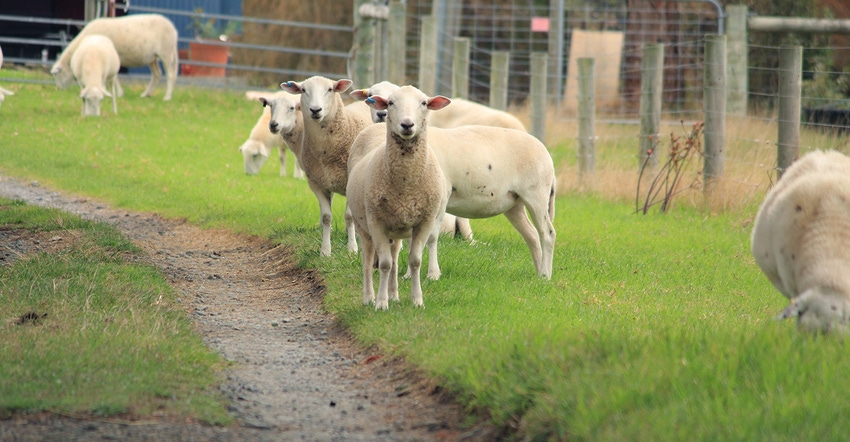May 29, 2017

A hot summer for growing spring-born lambs can bring on health and performance challenges. Some of these challenges can affect lambs for their entire lives.
"Heat-stressed lambs could experience a decrease in growth rate due to a loss of appetite and suppressed immunity, which can lead to other health challenges," Julian (Skip) Olson, DVM, technical services manager for Milk Products, says in a news release. "Sheep are most comfortable at 45 to 70 degrees F. When humidity sets in or temps go above 75 degrees F, sheep begin to feel the negative effects of the heat."
Olson offers these four tips to help your flock stay comfortable and healthy all summer long.
1. Keep lambs hydrated. Growing lambs need to drink water more often than adult ewes or rams due to a higher metabolism rate, says Olson. On average, growing lambs will drink 1 to 2 gallons of water per day, according to a University of Missouri study. During times of heat stress, sheep water consumption typically increases by 50% once temperatures reach 70 degrees F — and by nearly 100% at 80 degrees F.
During periods of heat stress, farmers should offer sheep free-choice electrolytes with their water two to three times per day. Electrolyte supplements containing electrolytes, energy and amino acids are designed to help replenish fluids and lost nutrients.
2. Provide shade and ventilation. Shade gives a flock a break from the sun's heat. Natural shade includes large trees, bushes and even stacks of hay. If natural shade is not available, Olson says farmers may consider a shade cloth, mesh fabric or even a tarp.
"Regardless of the shade option you choose, it is important to provide enough shade for the entire flock to lie down at the same time," he adds.
If housing your sheep in a permanent structure such as a shed or barn, provide ample ventilation. An effective ventilation system during warm weather cools the building by replacing the warm air inside with fresh air and also removes excess moisture. Proper ventilation can be achieved either naturally (without fans) or mechanically (with fans).
3. Offer high-quality nutrition. Farmers should assess forage quality in peak summer months, as pasture quality is typically lower during hot weather. A high-quality grain mix can help offset reduced growth rates during warm weather.
Hot weather can also reduce ewes' milk production. If your lambs have not been weaned, ensure they are receiving enough energy to grow and thrive.
"If milk production drops in heat-stressed ewes, supplemental liquid nutrition is needed. Look to a lamb milk replacer containing at least 23% protein and 30%fat," says Olson. "Milk replacer needs will vary depending on your lamb's weight and appetite, so be sure to read the bag instructions to ensure you're providing adequate nutrition."
4. Identify heat stress early. Despite your best efforts, heat stress may be inevitable in some cases. It is important that farmers know how to identify heat stress and act quickly to remedy it. Here are a few signs of heat stress:
• continuous panting
• rapid breathing
• weakness
• inability to stand
• elevated rectal temperature (over 105 degrees F; a rectal temperature exceeding 107 degrees F can be fatal)
"Avoid rinsing lambs with water to cool them off," Olson says. He explains that while evaporative cooling works well with many other animals, this is not the case with sheep. Air flows through the wool, which helps regulate body temperature; when wool is wet, air is not able to flow through it.
If you are uncertain about whether a lamb suffers from heat stress, consult your local veterinarian.
Source: Milk Products
You May Also Like




